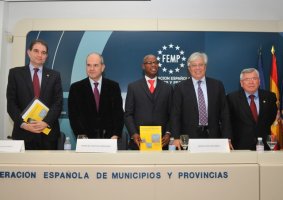
FEDERACION ESPAÑOLA DE MUNICIPIOS Y PROVINCIAS
- Contact |
- Who are we? |
- Site Map |
- Job offers
Presentation of the second global report on decentralization and local democracy
Decentralization processes are at risk in some countries as a result of the economic crisis. Given this trend, local authorities respond that they are key players to overcome the current situation. Of this issue and also the problems of financing local governments is the second global report presented at the FEMP GOLD, attended the Third Deputy Prime Minister, Manuel Chaves
The Second Global Report on Decentralisation and Local Democracy (GOLD II), prepared by the United Cities and Local Governments (UCLG) is the reference text that analyzes and elaborates on the current status of government closest to citizens. The work of this year is focusing on financing and focuses its attention on the challenges of municipalities and cities in the current context of global economic crisis.
The report draws attention, inter alia, on the "tension" currently existing between those advocating the importance of local governments at the start of the crisis and the tendency to return to a pooling of resources and skills to the State. According UCLG, the risk of "recentering" is real in many countries, despite the magnitude of the tasks performed by local governments.
Measures taken by national governments of some countries, the authors of the report, "could represent a break or a change in the trend towards decentralization and immediately affect the sustainability and performance of Local Governments" at a time when it is more necessary than ever to count on them to carry out the processes of development planning and policy making for social cohesion, "as necessary to mitigate the effects of the current global crisis."
The report's conclusions GOLD II have been exposed by Antoni Fogué, President of the Diputación Provincial de Barcelona, in a ceremony in which they operated the Third Deputy Prime Minister and Minister of Territorial Policy and Public Administration, Manuel Chaves, the President of the FEMP, Pedro Castro, and the Executive Director of UN-Habitat, Joan Clos.
In this report involved various levels of government, as the United Nations Human Settlements Programme (UN-Habitat), coordinator of a national dialogue project of decentralization, which has the support of the Ministry of Territorial Policy and Public Administration The FEMP and the Committee on Decentralization and Local Autonomy of UCLG, chaired by the Provincial Council of Barcelona.
The President of the FEMP, Pedro Castro, in his speech, explained that the funding is one of the issues that "concern and worry us most," because local autonomy can not be fully effective without adequate financing and that "our responsibility, as custodian of the hopes of our neighbors, we require the ability to meet their needs. "
Pedro Castro added that all the Mayors of the world have the same or similar problems, so decentralization is an "unavoidable challenge" to meet the needs of the territories and health guarantee democratic, allowing encourage the participation of civil society and nongovernmental organizations in defining public policy, "and I can not think of a better place to develop the participatory democracy that the town."
Manuel Chaves, meanwhile, said the commitment by the municipality is fundamental to democracy and in this regard, he stressed the role that the Government had intended to give to the municipalities, through two investment funds in 2009 and 2010 thanks to which it has improved the lives of citizens in more than eight thousand Spanish municipalities.
The Minister also wanted to recognize the role of local governments at the start of the crisis, despite the funding problems they have, and its contribution to deficit reduction.
Conclusions of the report
The report shows that there is a degree of confusion "interested" when talking about decentralization, which is not the same as devolution, a concept antithetical to local autonomy. It also notes that the heterogeneity among local governments in the world is very high. While Europeans spend on average 3,250 euros per inhabitant per year, Africans spend 24.
In this line, GOLD claim the need to gradually thinning transfers from central government to local governments and the promotion of tax forms that allow them greater ability to tax and, consequently, a higher degree of autonomy in revenue. In this respect, gives an example: 70% of the financing of the Tokyo metropolitan area comes from local taxes themselves.
The government of large cities or metropolitan regions is a complex, but is expected to become increasingly common. The report notes that usually dominates the desire to maintain a comparable structure of local government on the need for specific government formulas for the management of changing crowds and wide range. In these cases it is especially important role they can perform intermediate governments capable
to deal with realities that go beyond the area of influence of each of the local governments that make up the agglomeration.
In a more general level, the report says the main challenges of local governments lack of clear responsibilities and limited resources, the existence of global problems such as the financial crisis, the crisis of environment and natural resources, and crisis demographic. Similarly, says the backlog of infrastructure, according to a World Bank estimate, could only be resolved at a cost of 200,000 million annually over the next 25 years.



